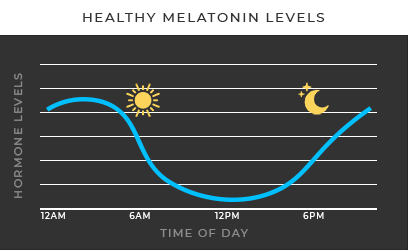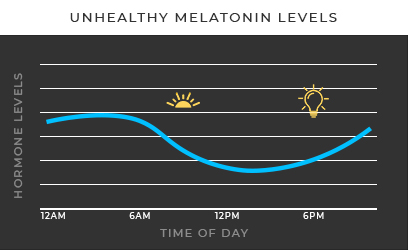We know that those on a whole foods plant-based diet will be deficient in Vitamin B12 without a supplement and therefore need it for optimal health. We also know that most people will be deficient in Vitamin D3 without consistent sun exposure and therefore need a supplement for optimal health. But what about sleep? Are there any deficiencies we commonly see that could hurt our sleep and be improved with supplementation? Could extra doses of melatonin, magnesium, and tryptophan which are important for sleep, improve our sleep quality? And what about some of the new and trendy supplements like CBD, L-Theanine, and Valerian Root? It’s made me wonder… are there any sleep supplements worth taking? Well, I spent hours combing through the findings of sleep and supplement experts Matthew Walker, Andrew Huberman, and Michael Greger and found some interesting results. So, let’s get into it!
Melatonin
Let’s start off with the most popular sleep supplement on the market, melatonin. Melatonin is a hormone released by the pineal gland in the brain which does many things including making us feel sleepy. And it’s predominantly regulated by light exposure. So, as I mentioned in a previous post, when we experience early morning light exposure, the pineal gland halts the secretion of melatonin and sleepiness should fade away. But as it gets dark at night and our light exposure is limited, the pineal gland will start to release melatonin again which brings about evening sleepiness. But the important thing to know about melatonin is that it only helps us fall asleep and not stay asleep. As Matthew Walker puts it, if you were to think of sleep as a 100-meter race, then melatonin is the gun that initiates the race, but it doesn’t have a leg in the competition. So, theoretically if you wanted to supplement your sleep with melatonin, it may help you fall asleep quicker but would not help with your overall sleep quality, continuity, or duration therefore making it not a particularly good sleep aid.
On top of that, since melatonin is considered a supplement and not a drug by the FDA, it’s fairly unregulated. What this means is that if you were to buy a sleep supplement, you should feel confident that the dose and potency listed on the bottle doesn’t match its actual contents. Studies have measured numerous melatonin supplement brands and have found between 83% less and 478% more melatonin in the supplement than what was listed on the label. So, you can rarely determine how much you’re actually consuming with that much variability!
But why does this matter? Well, in several animal species the release of elevated levels of melatonin in seasonal breeding animals shrinks the ovaries in females, and the testicles in males, enough so that they become infertile. In certain hamsters, the testicles can shrink from the size of a grape all the way down to a grain of rice! I thought about making a graphic for this but… I think your imagination is enough 😅. And while this doesn’t happen in humans, a study concluded “to assume [it] would not have some sexual effect in humans would almost seem naive.” Melatonin also can affect the release of certain hormones which trigger puberty and regulate our body. This has led many experts to recommend avoiding melatonin supplementation, especially in kids who haven’t gone through puberty yet.
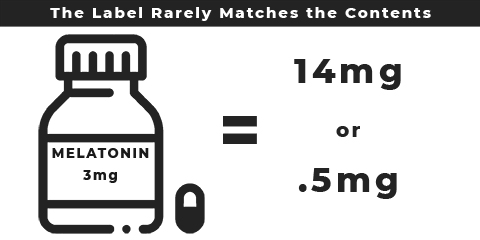
I should note that there are some studies that have reported positive benefits of melatonin supplementation on sleep regarding those with jet lag from traveling multiple time zones, and the elderly whose natural melatonin levels fall as they age. While there may be certain one-off scenarios where melatonin supplementation could be useful, I think the risks of regular use regarding a healthy reproductive and endocrine system, aren’t worth the tiny reward. And if you’re worried about managing your melatonin levels, you’ll have a lot more benefits without any of the risks through lifestyle changes! Managing your light exposure, environmental temperature, and exercise schedule can almost always dial in your melatonin levels optimally. And if you want to supplement, maybe first try it with melatonin containing whole foods like pistachios, goji berries, or raspberries an hour before bedtime. Another win for the whole foods plant-based diet as you’re not going to find much melatonin in meat or dairy.
Magnesium
Next, let’s touch on magnesium. Magnesium is a mineral that’s critical in allowing the body and mind to function healthfully. It has several benefits including reducing anxiety, increasing relaxation, and quieting down the nervous system. And these functions are all necessary to get high quality sleep. So, it’d only make sense that proper magnesium consumption would aid in sleep. And when put to the test, some studies have shown small benefits of magnesium supplementation on sleep but mostly with the elderly. And this made me wonder, why would the elderly seem to benefit more than anyone else? Well, it turns out that 48% of all Americans don’t meet their respective magnesium intake recommendations with the elderly being the most deficient. Therefore, my thoughts based on the research is extra magnesium can help with sleep if you have a deficiency already but if you’re already getting the proper amount, an extra supplementation may not do too much.
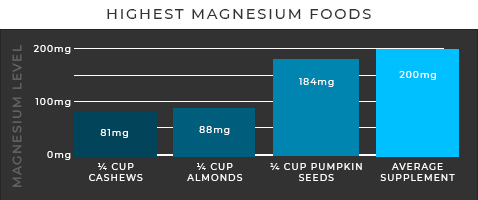
So, what’s the best way to get our daily intake of magnesium? Well, it turns out that magnesium supplements do work at raising magnesium levels, but they can often lead to diarrhea, nausea, and abdominal cramping. And that’s something I like to avoid. Luckily, magnesium is found abundantly in… whole plant foods! You guessed it. Green leafy vegetables, nuts and seeds are the best sources of dietary magnesium with just 1/4 cup of pumpkin seeds providing 46% of your daily value. So, focus on eating a whole foods plant-based diet and you won’t have to worry about your magnesium levels. And since this is what I do, I’m taking a pass on the magnesium supplements and opting for some plants!
Serotonin / Tryptophan
Now, let’s quickly discuss serotonin. Serotonin is a hormone that helps us to regulate our mood and feel satisfied. Often, when people are depressed, they have low serotonin levels. But serotonin is also responsible for building up our pressure to sleep throughout the day and into night. And if you’re low on serotonin then you may have difficulty sleeping too. So, you might think that consuming serotonin through food or a supplement would help with sleep, but it doesn’t. Serotonin levels can rise in the blood from consumption of high-serotonin foods or supplements, but the hormone doesn’t pass the highly coveted blood-brain barrier. That barrier has more important things it needs to let pass like water, glucose, and essential amino acids.
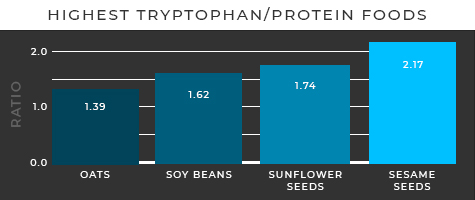
But it turns out that tryptophan is an essential amino acid that not only passes the blood-brain barrier, but also is vital in creating serotonin. So, by consuming tryptophan we theoretically should be able to raise our serotonin levels which should promote high-quality sleep. And when put to the test, it does! And then the next question is, what’s the best way to raise our tryptophan levels? Well, it turns out that supplements do work but they also appear to reduce our overall deep sleep and produce more REM sleep which isn’t ideal. Also, tryptophan supplements have had a history of impurities which have led to cases of eosinophilia-myalgia syndrome, which is incurable, debilitating, and sometimes fatal. This sounds like something I also want to avoid. Luckily, whole plant foods can come to the rescue again with sesame, sunflower, and pumpkin seeds providing the highest tryptophan to total protein ratio. Not only does consumption of foods like this avoid the possibility of getting eosinophilia-myalgia, but it also doesn’t alter your deep vs REM sleep stages either. Therefore, I’m thinking its best to avoid tryptophan supplementation too and stick to plants.
CBD
And lastly, I’ll quickly cover CBD. I was going to touch on L-Theanine, Chamomile, and Valerian Root but there just isn’t any good scientific data for me to base my opinion on. And while there isn’t a lot of data on CBD either, this is what we have so far. Some early-stage studies have found that CBD can reduce anxiety in certain situations at the right doses. This calming effect could help people fall asleep quicker, but we have no idea of the significance of these benefits or the possible side effects. Some early-stage studies have even shown that too much CBD can inhibit sleep. But it does appear to be a better option than THC which is found in marijuana. THC on the other hand not only has dependence and tolerance concerns but can be detrimental to sleep quality because it limits your ability to generate REM sleep. So right now, I’m thinking I’ll skip on the CBD as well.
Final Thoughts
Certainly, melatonin is a critical hormone for sleep but its best managed through early morning light exposure, followed by evening light restriction. Magnesium also plays a key role for sleep, but its best consumed through plant-based whole foods like pumpkin seeds, almonds, and cashews. Serotonin not only helps with depression and mood but aides in sleep too. And one of the easy ways to increase serotonin is by increasing your consumption of tryptophan through plant-based whole foods like sesame seeds and sunflower seeds. And while CBD may have a couple studies on its side, the data isn’t too useful now like L-Theanine, Chamomile, and Valerian Root. So, if you’re looking to optimize your sleep, your best bet is skipping the supplements and focusing on lifestyle behaviors that’ll have a much larger effect.
Looking for my Top 10 Sleep Tips to effectively manage melatonin levels? Check out my free health kit and weekly newsletter.
Watch a YouTube Video Summarizing the Post

Hey, I am Brandon Zerbe
Welcome to myHealthSciences! My goal has always been to increase quality-of-life with healthy habits that are sustainable, efficient, and effective. I do this by covering topics like Fitness, Nutrition, Sleep, Cognition, Finance and Minimalism. You can read more about me here.
Sources:
- Melatonin & Breast Cancer
- Are Melatonin Supplements Safe?
- How to Treat Jet Lag with Melatonin-Rich Food
- Melatonin: What You Need To Know
- What Is Magnesium? Plus the Top 20 Magnesium-Rich Foods
- Sleep and Magnesium Supplements
- The Effect Of Magnesium Supplementation On Primary Insomnia In Elderly: A Double-Blind Placebo-Controlled Clinical Trial
- How Magnesium Can Help You Sleep
- Magnesium Rich Food
- The Wrong Way to Boost Serotonin
- A Better Way to Boost Serotonin
- The Best Way to Boost Serotonin
- Why We Sleep: Unlocking the Power of Sleep and Dreams
- Find Your Temperature Minimum to Defeat Jetlag, Shift Work & Sleeplessness | Huberman Lab Podcast #4
- #49–Matt Walker, Ph.D., on Sleep (Part 3 of 3) | Peter Attia MD
- Blood–Brain Barrier
- Tryptophan

